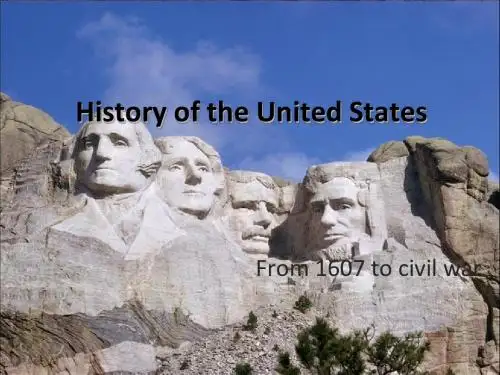资料美国历史英文版.ppt
- 格式:ppt
- 大小:2.73 MB
- 文档页数:49
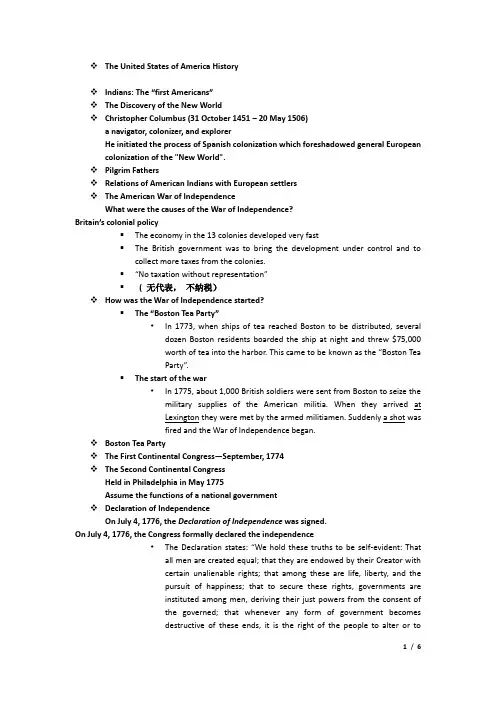
The United States of America HistoryIndians: The “first Americans”The Discovery of the New WorldChristopher Columbus (31 October 1451 – 20 May 1506)a navigator, colonizer, and explorerHe initiated the process of Spanish colonization which foreshadowed general European colonization of the "New World".Pilgrim FathersRelations of American Indians with European settlersThe American War of IndependenceWhat were the causes of the War of Independence?Britain’s colonial policy▪The economy in the 13 colonies developed very fast▪The British government was to bring the development under control and to collect more taxes from the colonies.▪“No taxation without representation”▪( 无代表,不纳税)How was the War of Independence started?▪The “Boston Tea Party”•In 1773, when ships of tea reached Boston to be distributed, severaldozen Boston residents boarded the ship at night and threw $75,000worth of tea into the harbor. This came to be known as the “Boston TeaParty”.▪The start of the war•In 1775, about 1,000 British soldiers were sent from Boston to seize themilitary supplies of the American militia. When they arrived atLexington they were met by the armed militiamen. Suddenly a shot wasfired and the War of Independence began.Boston Tea PartyThe First Continental Congress—September, 1774The Second Continental CongressHeld in Philadelphia in May 1775Assume the functions of a national governmentDeclaration of IndependenceOn July 4, 1776, the Declaration of Independence was signed.On July 4, 1776, the Congress formally declared the independence•The Declaration states: “We hold these truths to be self-evident: Thatall men are created equal; that they are endowed by their Creator withcertain unalienable rights; that among these are life, liberty, and thepursuit of happiness; that to secure these rights, governments areinstituted among men, deriving their just powers from the consent ofthe governed; that whenever any form of government becomesdestructive of these ends, it is the right of the people to alter or toabolish it, …”After being printed, the copies were sent out, broadcast and read to crowds everywhere.▪The document greatly encouraged the struggling people, making them think that they should be independent and have the right to enjoy liberty.▪They were beginning to show more interests in a common cause.▪Both a great influence on the course of the war and a far-reaching influence in world history as well.It dragged on for seven years. (1775-1783)Obstacles for the continental army:▪No enough supplies.▪Tired and hungry, while British troops fresh and well-equipped.▪By the middle of December, 1776, the Revolution seemed lost.The victory at Saratoga (1777, October)—turning point.The assistance from France▪Benjamin Franklin—a messenger to Europe to get help from other countries.▪The French King made two agreements with Franklin:•France would take part in the war against England.•They agreed to trade with each other.•Spain and Holland joined France against England—a quick end to the war.In 1781, a decisive victory at Yorktown in VirginiaOn October 19, 1781, the British general Cornwallis was forced to surrender, the war came to an end.The two parts signed the Treaty of Paris in 1783—America won its independence2.5 The Establishment of ConstitutionOn May 25, 1787, the constitution was drafted.In June 1789, the constitution came into effect in nine states.Ten amendments—The Bill of Rights—were added to the Constitution in 1791.The Civil War (1861-1865)Causes of Civil WarEconomic reason:▪two different economic systemsNorth Capitalist EconomySouth PlantationPolitical reason▪The North—Federal Government as a union▪The South—The Confederate Government: the independence of each stateUncle Tom’s Cabin Published in 1852Harriet Beecher Stowe ( l811-1896 )An antislavery novel which had great political influence."So this is the little lady who made this big war.“ ---LincolnAbraham Lincoln was elected president and opposed the expansion of slavery.Some southern states formed the Confederate States of America in 1861.Union army Vs. Confederate army3.2 Comparison of PowerThe North:▪twenty-three states, 22 million population▪abundant facilities to manufacture arms and ammunition, clothing, andother supplies▪merchant marines and the navy remained in Union hands▪federal government was better able to raise fund for war The South:▪eleven states, 9 million population▪military advantages:▪actively preparing for war▪in possession of many federal forts and arsenals▪superior military leadership: a third of the regular army's officers werefrom the South▪fighting on its own soilEmancipation Proclamationissued by Pres. Abraham Lincoln that freed the slaves of the Confederacy.-This transformed the war from a war to save the Union, to a war to abolish slavery.Battle of Gettysburg (July 1863) The turning pointGettysburg Address“Government of the People, by the People and for the People shall not perish from the earth”Influence of the Civil WarOutbreak of the First World War (1914-1918)▪Inevitable result of contradiction between two groups of imperialist powers: •Allies(协约国)—Britain, France, and Russia•The Central European Powers(同盟国)—Germany, Austria-Hungary andItaly▪The political, economic and colonial rivalries of the great powers.4.1 World War IThe False Prosperity in the 1920’s1920’s = boom, prosperity, isolationisma period of material success and spiritual frustration or confusion and purposelessnessErnest Hemingway (1899-1961)欧内斯特·海明威1. ReputationSpokesman for the Lost GenerationA Nobel Prize winner for literature in 1954Life Story1899Born in Illinois (his father was a highly respected doctor, his mother was a singer and music teacher)1917After graduation from High School, he left home and worked for the Star as a reporter; Rejected by the American Army because of his poor vision in one eye 1918Served as an ambulance driver in France, and then as a soldier in the Italian infantry Wounded on both legs1919Returned home to complete his recovery1925Left for Paris1936Took part in the Spanish Civil War as a journalist, on the Republican side1940Moved to Cuba1954Awarded the Nobel Prize1961Committed suicide by shooting himself with his hunting gunMajor WorksIn Our Time (1925) 《在我们的时代里》Collection of short storiesPortray the world of adulthood as an arena of danger and violenceThe Torrent of Spring (1926) 《春潮》The Sun Also Rises (1926) 《太阳照常升起》The disillusionment of the lost generationA Farewell to Arms (1929) 《永别了,武器》For Whom the Bell Tolls (1940) 《丧钟为谁而鸣》A love story, a war novelThe Old Man and the Sea (1952) 《老人与海》a man can be destroyed but not defeated一个人可以被毁灭(physically),但不能给打败(spiritually)Writing Style4.1 “Hemingway Code heros”Those who survive in the process of seeking to master the code, known as “grace under pressure”, with the honesty, the discipline, and the restraint.eg: Cuban fisherman Santiagofighting a losing battle---loss becomes dignity4.2 iceberg theory of writingHis sentences only give one small bit of the meaning; the rest is impliedThe Great Depression1930’s = Great DepressionThe stock market crash in1929Massive unemployment, factory and mill closings, and mortgage foreclosures Core of the problem—immense disparity between the productive capacity and the ability of people to consumeWorld War II broke out in September, 1939 and ended in August, 1945.Background of the warThe World Spread economic crisisGermany and Italy began their ways of fascism and military expansion.Japan meant to conquer China and Southeast Asia by military expansion.Two opposing military alliances:the Allies (同盟国)and the Axis (轴心国)the deadliest conflict in all of human historyUSA attitude:▪ A sit-on-the-fence policy•do trade with the warring countries, including the aggressors•believe in “glorious isolation”▪Its negative effect:•Isolationism encouraged Nazi and Adolph Hitler to believe that they could rely on American neutrality and their victims could not buymunitions in US.•Japan believed that pacifist US would not fight for the integrity of China. On the morning of December 7, 1941, Japanese air force attacked the US Pacific fleet at Pearl Ha rbor, Hawaii. It was the direct cause for America’s entrance into the war.End of WWII▪The US air force dropped atomic bombs on Hiroshima On August 6 and on Nagasaki on August 8.▪On September 2, 1945, Japan surrendered.The Cold War▪United Nations in 1945—a new and better world would emerge from World War II.▪The conflict between the two superpowers Russia and the US increased and later led to the Cold War.Truman Doctrinethe principle that the US should give support to countries or peoples threatened by Soviet forces or Communist insurrection. First expressed in 1947 by US President Truman in a speech to Congress seeking aid for Greece and Turkey, the doctrine was seen by the Communists as an open declaration of the cold war杜鲁门主义(该主义认为美国应支持受苏联军队或共产党叛乱威胁的国家或民族;该主义的首次表述出现于1947年美国总统杜鲁门在国会所作的关于要求对希腊和土耳其提供援助的演说中,这被共产党人视为公开的冷战宣言)NATO▪In 1949, the United States—in company with 11 other powers—entered into the North Atlantic Treaty Organization (NATO).The Vietnam War▪ A long-time suffering for the US▪Started under Eisenhower and continued by Kennedy and Johnson•In 1965 US sent in troops to prevent the South Vietnamese government from collapsing. Ultimately, a failure•In 1975 Vietnam was reunified under Communist control.The Civil Rights MovementTwo other diplomatic breakthroughs:▪Re-establishing US relations with the People’s Republic of China▪Negotiating the first Strategic Arms Limitation Treaty with the Soviet Union •Table Tennis Foreign Policy/Ping pong diplomacy•Nixon–first US president visited Beijing.•The “Shanghai Communiqué”—a new US policy:–there was one China;–Taiwan was part of China;– a peaceful settlement of the dispute by the Chinese themselveswas in American interest.Watergate Scandal of President Richard Nixon in 1972the illegal sabotage and espionage of Nixon’s Committee to Re-elect the President.Impeachment ---charge (the holder of a public office) with misconduct弹劾(官员) Watergate Scandal⏹To defeat his adversary, Nixon hired five burglars to set up wiretaps(窃听装置) to getconfidential information in the Democratic National Committee offices in the Watergate complex ;⏹It was exposed and became the biggest political scandal in the history of America;⏹Because of the pressure of public, Nixon was impeached and resigned in 1974.水门事件与华盛顿邮报1972: 尼克松总统为竞选连任在对手竞选总部安装窃听器被”深喉”举报给<华盛顿邮报>尼克松威胁: 报道误导,不公正<华盛顿邮报纸>不为所动两年之后,尼克松成为美国历史上第一位被被弹劾的总统<华盛顿邮报>记者Carl Bernstein, Bob Woodward获普利策奖America Since 1980’sRonald ReganAt sixty nine, Reagan became the oldest person ever elected as US President in 1980.•Economic program–reductions in income taxes and business taxes–deep cuts in federal spending in every area except defenseGeorge W. Bush Period▪George W. Bush: The 43rd president of the US elected in 2000▪During his first term, three major tax cuts▪Since 2003, America has had the fastest-growing economyThe war against terrorism▪Terrorist Event on September 11, 2001Invasion of Iraq▪On March 19, 2003 an invasion of Iraq by American and British troops started, supported by small contingents from several other countries.•“Trial of century”—the trial of Saddam began on October, 19, 2005 in Baghdad.•Saddam is accused of crimes against humanity.。

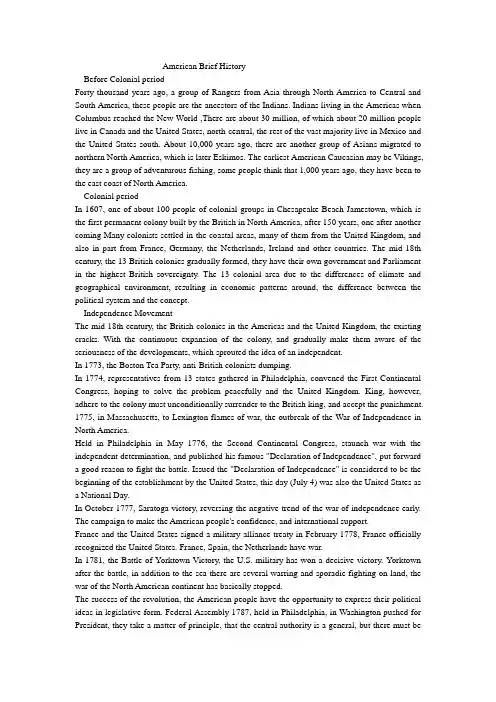
American Brief HistoryBefore Colonial periodForty thousand years ago, a group of Rangers from Asia through North America to Central and South America, these people are the ancestors of the Indians. Indians living in the Americas when Columbus reached the New World ,There are about 30 million, of which about 20 million people live in Canada and the United States, north-central, the rest of the vast majority live in Mexico and the United States south. About 10,000 years ago, there are another group of Asians migrated to northern North America, which is later Eskimos. The earliest American Caucasian may be Vikings, they are a group of adventurous fishing, some people think that 1,000 years ago, they have been to the east coast of North America.Colonial periodIn 1607, one of about 100 people of colonial groups in Chesapeake Beach Jamestown, which is the first permanent colony built by the British in North America, after 150 years, one after another coming Many colonists settled in the coastal areas, many of them from the United Kingdom, and also in part from France, Germany, the Netherlands, Ireland and other countries. The mid-18th century, the 13 British colonies gradually formed, they have their own government and Parliament in the highest British sovereignty. The 13 colonial area due to the differences of climate and geographical environment, resulting in economic patterns around, the difference between the political system and the concept.Independence MovementThe mid-18th century, the British colonies in the Americas and the United Kingdom, the existing cracks. With the continuous expansion of the colony, and gradually make them aware of the seriousness of the developments, which sprouted the idea of an independent.In 1773, the Boston Tea Party, anti-British colonists dumping.In 1774, representatives from 13 states gathered in Philadelphia, convened the First Continental Congress, hoping to solve the problem peacefully and the United Kingdom. King, however, adhere to the colony must unconditionally surrender to the British king, and accept the punishment. 1775, in Massachusetts, to Lexington flames of war, the outbreak of the War of Independence in North America.Held in Philadelphia in May 1776, the Second Continental Congress, staunch war with the independent determination, and published his famous "Declaration of Independence", put forward a good reason to fight the battle. Issued the "Declaration of Independence" is considered to be the beginning of the establishment by the United States, this day (July 4) was also the United States as a National Day.In October 1777, Saratoga victory, reversing the negative trend of the war of independence early. The campaign to make the American people's confidence, and international support.France and the United States signed a military alliance treaty in February 1778, France officially recognized the United States. France, Spain, the Netherlands have war.In 1781, the Battle of Yorktown Victory, the U.S. military has won a decisive victory. Yorktown after the battle, in addition to the sea there are several warring and sporadic fighting on land, the war of the North American continent has basically stopped.The success of the revolution, the American people have the opportunity to express their political ideas in legislative form. Federal Assembly 1787, held in Philadelphia, in Washington pushed for President, they take a matter of principle, that the central authority is a general, but there must beprudent regulations and instructions, at the same time, they also accept the fact that national government must tax, coin money, to adjust the commercial, a declaration of war and the power to enter into treaties. In addition, in order to prevent the central authority is too large, and to take the politics Montesquieu doctrine, that the Government set three equal cooperation with the department, that the three powers of the legislative, executive, and judicial checks and balances to reconcile checks and balances, rather than make any rights accounted for controlling position.In 1812, Britain again invaded the newly established United States, known as the Second War of Independence, the post-war U.S. states more united.Westward expansionThe early 19th century, thousands of people across the Appalachian Mountains, moved west. Some pioneers, emigrated to the United States border, belong to the territory of Latin America north of Mexico, between Alaska and California, Oregon and even depth.In 1846, the outbreak of the Mexican-American War, the United States expanded their area.Civil WarThe cause of the Civil War, not only economic, political, military and ideological conflict. The civil war has exposed the weakness of the United States. The existence of this country, and made some test. After the test, the United States was moving towards the royal road to a centralized modern state. Slavery issue between the North and the South would disagree, the main policy of the South in national politics, in the protection and expansion of the interests represented by the system of cotton and slaves; northern states, mainly manufacturing, commercial and financial center These production without relying on slaves.This economic and political conflict is long-standing. The early 1860s, 11 Southern states seceded from the Union, and another group of government, said of the North, will be willing to pay any price in order to unify. In 1861, civil war broke out in this bloody war Americans face-to-face, after four years. April 9, 1865, the southern government failed, this victory is not only the U.S. recovery unified, but also from all over the country is no longer the purposes of slavery. Industrialization and reformThe early 19th century, the United States began to industrialization after the civil war entered a mature stage. Become urbanized country in less than 50 years from the Civil War to World War I, the United States from a rural republic. From the 1890-1917 year for the past 30 years, is known as the so-called "progressive period". In 1914, the outbreak of World War I; 1917, the United States was involved in World War whirlpool, and try to play a new role in the world.Great Depression and World War IIAffected by the Great Depression is not just the United States, the countries of the world have been implicated. Great Depression, millions of workers are unemployed, a large number of farmers were forced to give up farmland, factory shops closed, and bank failures in a recession. In 1932, Franklin Roosevelt (1882 to 1945) was elected president, he advocated that the government should take action to end the Great Depression, and then launched a series of policies to a temporary solution to alleviate many difficulties, but the economy of the United States or to the Second World World War II after waking up. After World War II, with the defeat of the Axis powers, Britain and France, the strength of the recession, the United States and the Soviet Union became a superpower, the world was divided into two camps of the East and the West. The United States and the Soviet Union and their respective camps were busy preparing the various aspects ofthe military, political, economic, and propaganda, as in wartime. This state is known as the "Cold War".During the Cold WarThe history of the United States since 1960, many ways is still a continuation of the post-war development. Economic aspects in addition to the cyclical downturn is still expanding; moved from the city to the suburbs of the population continues to increase, and in 1970, ranking rural population of more than the home city population. Early 1960, blacks become the main problem within the United States.The mid-1960s, many Americans began to be dissatisfied with the government's foreign policy. In addition, due to the concentration of industrial development and population, the late 1960s, the ecological environment pollution wide attention. Since the early 1970s, the recession caused by the energy crisis of the worst. The mid-1970s, the U.S. economy once recovery. But not period in the 1970s, and inflation.In 1976, the 200th anniversary of the founding of the United States, the country held various celebrations. The United States in the Cold War eventually caused the collapse of the Soviet Union in 1991, with the collapse of the Soviet Union, the United States as the world's only superpower, the ideological barriers between the two camps in the world is broken. April 12, 1981, the United States launched the space shuttle Columbia, humans have brought in another space a new era. Terrorist attacks and counter-terrorism policy9.11 in New York and Washington in 2001, "have an enormous impact on the United States and the world, this event is by far the most serious terrorist attacks in human history. The U.S. government condemned this incident and stand by the sympathy and support of most countries; around the world after the events in a variety of commemorative activities. The incident also led to a U.S. foreign policy focused on dealing with the threat of terrorism. The U.S. government started the war on terror and action to overthrow the Taliban regime in Afghanistan in October 2001. In 2003, the United States launched the war in Iraq, the overthrow of the regime of Saddam Hussein, the Iraqi interim government. • May 1, 2011, the Osama bin Laden in the Pakistani capital of Islamabad, the U.S. Navy Seals killed.。
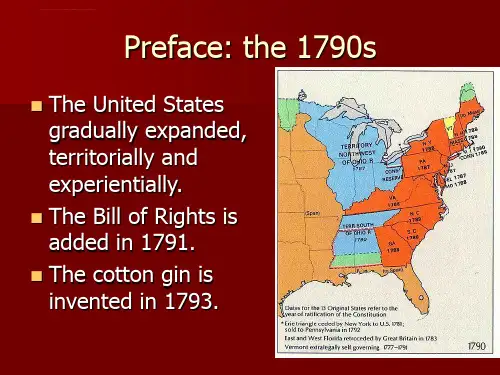
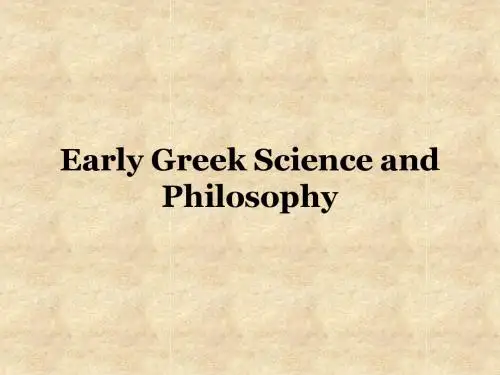
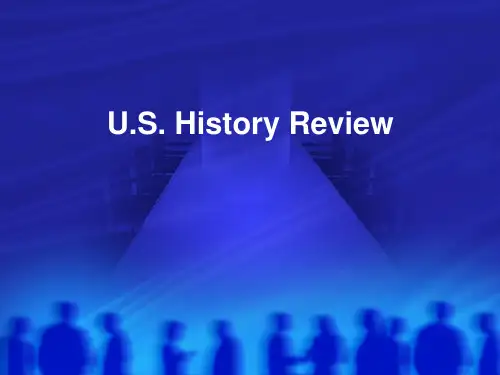
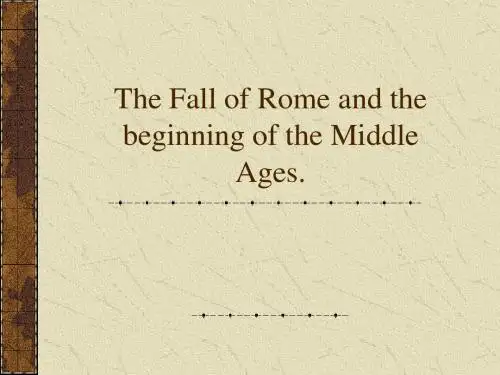
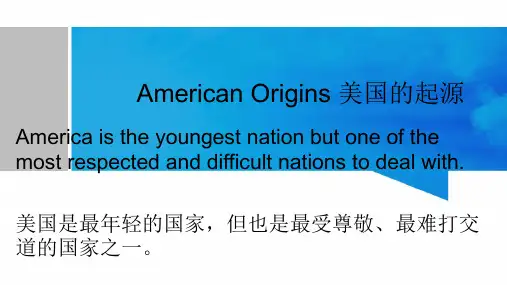
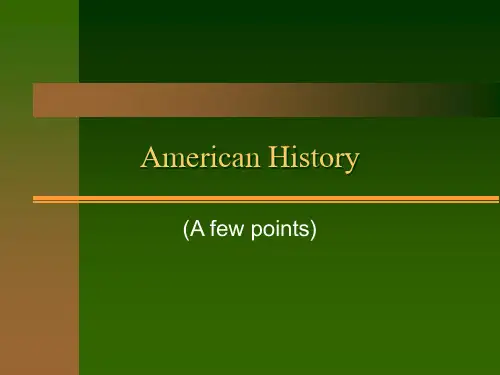
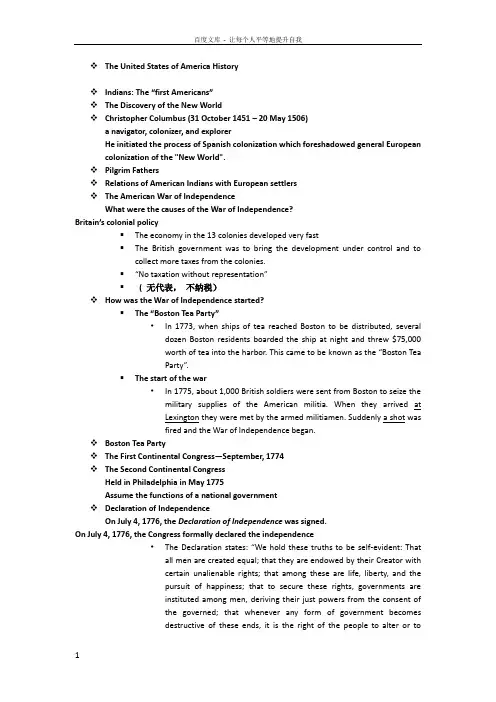
❖The United States of America History❖Indians: The “first Americans”❖The Discovery of the New World❖Christopher Columbus (31 October 1451 – 20 May 1506)a navigator, colonizer, and explorerHe initiated the process of Spanish colonization which foreshadowed general European colonization of the "New World".❖Pilgrim Fathers❖Relations of American Indians with European settlers❖The American War of IndependenceWhat were the causes of the War of Independence?Britain’s colonial policy▪The economy in the 13 colonies developed very fast▪The British government was to bring the development under control and to collect more taxes from the colonies.▪“No taxation without representation”▪( 无代表,不纳税)❖How was the War of Independence started?▪The “Boston Tea Party”•In 1773, when ships of tea reached Boston to be distributed, severaldozen Boston residents boarded the ship at night and threw $75,000worth of tea into the harbor. This came to be known as the “Boston TeaParty”.▪The start of the war•In 1775, about 1,000 British soldiers were sent from Boston to seize themilitary supplies of the American militia. When they arrived atLexington they were met by the armed militiamen. Suddenly a shot wasfired and the War of Independence began.❖Boston Tea Party❖The First Continental Congress—September, 1774❖The Second Continental CongressHeld in Philadelphia in May 1775Assume the functions of a national government❖Declaration of IndependenceOn July 4, 1776, the Declaration of Independence was signed.On July 4, 1776, the Congress formally declared the independence•The Declaration states: “We hold these truths to be self-evident: Thatall men are created equal; that they are endowed by their Creator withcertain unalienable rights; that among these are life, liberty, and thepursuit of happiness; that to secure these rights, governments areinstituted among men, deriving their just powers from the consent ofthe governed; that whenever any form of government becomesdestructive of these ends, it is the right of the people to alter or toabolish it, …”After being printed, the copies were sent out, broadcast and read to crowds everywhere.▪The document greatly encouraged the struggling people, making them think that they should be independent and have the right to enjoy liberty.▪They were beginning to show more interests in a common cause.▪Both a great influence on the course of the war and a far-reaching influence in world history as well.❖It dragged on for seven years. (1775-1783)❖Obstacles for the continental army:▪No enough supplies.▪Tired and hungry, while British troops fresh and well-equipped.▪By the middle of December, 1776, the Revolution seemed lost.❖The victory at Saratoga (1777, October)—turning point.❖The assistance from France▪Benjamin Franklin—a messenger to Europe to get help from other countries.▪The French King made two agreements with Franklin:•France would take part in the war against England.•They agreed to trade with each other.•Spain and Holland joined France against England•—a quick end to the war.❖In 1781, a decisive victory at Yorktown in Virginia❖On October 19, 1781, the British general Cornwallis was forced to surrender, the war came to an end.❖The two parts signed the Treaty of Paris in 1783—America won its independence❖The Establishment of Constitution❖On May 25, 1787, the constitution was drafted.❖In June 1789, the constitution came into effect in nine states.❖Ten amendments—The Bill of Rights—were added to the Constitution in 1791.❖The Civil War (1861-1865)❖Causes of Civil War❖Economic reason:▪two different economic systemsNorth Capitalist EconomySouth Plantation❖Political reason▪The North—Federal Government as a union▪The South—The Confederate Government: the independence of each state❖Uncle Tom’s Cabin Published in 1852❖Harriet Beecher Stowe ( l811-1896 )❖An antislavery novel which had great political influence.❖"So this is the little lady who made this big war.“---Lincoln❖Abraham Lincoln was elected president and opposed the expansion of slavery.❖Some southern states formed the Confederate States of America in 1861.❖Union army Vs. Confederate army❖Comparison of Power❖The North:▪twenty-three states, 22 million population▪abundant facilities to manufacture arms and ammunition, clothing, andother supplies▪merchant marines and the navy remained in Union hands▪federal government was better able to raise fund for war ❖The South:▪eleven states, 9 million population▪military advantages:▪actively preparing for war▪in possession of many federal forts and arsenals▪superior military leadership: a third of the regular army's officers werefrom the South▪fighting on its own soil❖Emancipation Proclamationissued by Pres. Abraham Lincoln that freed the slaves of the Confederacy.-This transformed the war from a war to save the Union, to a war to abolish slavery.❖Battle of Gettysburg (July 1863) The turning pointGettysburg Address“Government of the People, by the People and for the People shall not perish from the earth”❖Influence of the Civil War❖Outbreak of the First World War (1914-1918)▪Inevitable result of contradiction between two groups of imperialist powers: •Allies(协约国)—Britain, France, and Russia•The Central European Powers(同盟国)—Germany, Austria-Hungary andItaly▪The political, economic and colonial rivalries of the great powers.❖World War I❖The False Prosperity in the 1920’s1920’s = boom, prosperity, isolationisma period of material success and spiritual frustration or confusion and purposelessness❖Ernest Hemingway (1899-1961)❖欧内斯特·海明威1. Reputation❖Spokesman for the Lost Generation❖ A Nobel Prize winner for literature in 1954❖Life Story1899Born in Illinois (his father was a highly respected doctor, his mother was a singer and music teacher)1917After graduation from High School, he left home and worked for the Star as a reporter; Rejected by the American Army because of his poor vision in one eye 1918Served as an ambulance driver in France, and then as a soldier in the Italian infantry Wounded on both legs1919Returned home to complete his recovery1925Left for Paris1936Took part in the Spanish Civil War as a journalist, on the Republican side1940Moved to Cuba1954Awarded the Nobel Prize1961Committed suicide by shooting himself with his hunting gun❖Major Works❖In Our Time (1925) 《在我们的时代里》Collection of short storiesPortray the world of adulthood as an arena of danger and violence❖The Torrent of Spring (1926) 《春潮》❖The Sun Also Rises (1926) 《太阳照常升起》The disillusionment of the lost generation❖ A Farewell to Arms (1929) 《永别了,武器》❖For Whom the Bell Tolls (1940) 《丧钟为谁而鸣》A love story, a war novel❖The Old Man and the Sea (1952) 《老人与海》a man can be destroyed but not defeated一个人可以被毁灭(physically),但不能给打败(spiritually)❖Writing Style“Hemingway Code heros”❖Those who survive in the process of seeking to master the code, known as “grace under pressure”, with the honesty, the discipline, and the restraint.eg: Cuban fisherman Santiagofighting a losing battle---loss becomes dignityiceberg theory of writing❖His sentences only give one small bit of the meaning; the rest is implied❖The Great Depression❖1930’s = Great DepressionThe stock market crash in1929Massive unemployment, factory and mill closings, and mortgage foreclosures ❖Core of the problem—immense disparity between the productive capacity and the ability of people to consume❖World War II broke out in September, 1939 and ended in August, 1945.❖Background of the warThe World Spread economic crisisGermany and Italy began their ways of fascism and military expansion.Japan meant to conquer China and Southeast Asia by military expansion.❖Two opposing military alliances:the (同盟国)and the (轴心国)❖the in all of human historyUSA attitude:▪ A sit-on-the-fence policy•do trade with the warring countries, including the aggressors•believe in “glorious isolation”▪Its negative effect:•Isolationism encouraged Nazi and Adolph Hitler to believe that they could rely on American neutrality and their victims could not buymunitions in US.•Japan believed that pacifist US would not fight for the integrity of China. ❖On the morning of December 7, 1941, Japanese air force attacked the US Pacific fleet at Pearl Harbor, Hawaii. It was the direct cause for America’s entrance into the war.❖End of WWII▪The US air force dropped atomic bombs on Hiroshima On August 6 and on Nagasaki on August 8.▪On September 2, 1945, Japan surrendered.❖The Cold War▪United Nations in 1945—a new and better world would emerge from World War II.▪The conflict between the two superpowers Russia and the US increased and later led to the Cold War.❖Truman Doctrinethe principle that the US should give support to countries or peoples threatened by Soviet forces or Communist insurrection. First expressed in 1947 by US President Truman in a speech to Congress seeking aid for Greece and Turkey, the doctrine was seen by the Communists as an open declaration of the cold war杜鲁门主义(该主义认为美国应支持受苏联军队或共产党叛乱威胁的国家或民族;该主义的首次表述出现于1947年美国总统杜鲁门在国会所作的关于要求对希腊和土耳其提供援助的演说中,这被共产党人视为公开的冷战宣言)❖NATO▪In 1949, the United States—in company with 11 other powers—entered into the North Atlantic Treaty Organization (NATO).❖The Vietnam War▪ A long-time suffering for the US▪Started under Eisenhower and continued by Kennedy and Johnson•In 1965 US sent in troops to prevent the South Vietnamese government from collapsing. Ultimately, a failure•In 1975 Vietnam was reunified under Communist control.❖The Civil Rights Movement❖Two other diplomatic breakthroughs:▪Re-establishing US relations with the People’s Republic of China▪Negotiating the first Strategic Arms Limitation Treaty with the Soviet Union •Table Tennis Foreign Policy/Ping pong diplomacy•Nixon–first US president visited Beijing.•The “Shanghai Communiqué”—a new US policy:–there was one China;–Taiwan was part of China;– a peaceful settlement of the dispute by the Chinese themselveswas in American interest.Watergate Scandal of President Richard Nixon in 1972the illegal sabotage and espionage of Nixon’s Committee to Re-elect the President.Impeachment ---charge (the holder of a public office) with misconduct弹劾(官员)❖Watergate Scandal⏹To defeat his adversary, Nixon hired five burglars to set up wiretaps(窃听装置) to getconfidential information in the Democratic National Committee offices in the Watergate complex ;⏹It was exposed and became the biggest political scandal in the history of America;⏹Because of the pressure of public, Nixon was impeached and resigned in 1974.水门事件与华盛顿邮报❖1972: 尼克松总统为竞选连任在对手竞选总部安装窃听器❖被”深喉”举报给<华盛顿邮报>❖尼克松威胁: 报道误导,不公正❖<华盛顿邮报纸>不为所动❖两年之后,尼克松成为美国历史上第一位被被弹劾的总统❖<华盛顿邮报>记者Carl Bernstein, Bob Woodward获普利策奖❖America Since 1980’s❖Ronald ReganAt sixty nine, Reagan became the oldest person ever elected as US President in 1980.•Economic program–reductions in income taxes and business taxes–deep cuts in federal spending in every area except defense❖George W. Bush Period▪George W. Bush: The 43rd president of the US elected in 2000▪During his first term, three major tax cuts▪Since 2003, America has had the fastest-growing economy❖The war against terrorism▪Terrorist Event on September 11, 2001❖Invasion of Iraq▪On March 19, 2003 an invasion of Iraq by American and British troops started, supported by small contingents from several other countries.•“Trial of century”—the trial of Saddam began on October, 19, 2005 in Baghdad.•Saddam is accused of crimes against humanity.。
